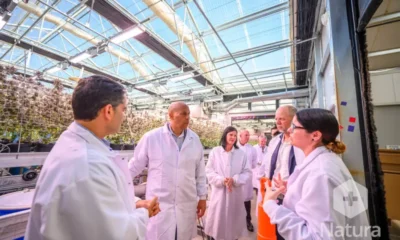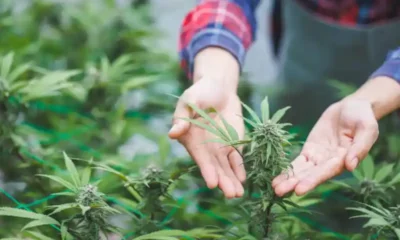Connect with us
Published
8 months agoon

After Missouri voted to legalize adult-use cannabis last year and promptly began sales only 87 days later in February of this year, the market is going strong, having surpassed $1 billion in legal weed sales (medical and recreational) in May. With the creation of nearly 8,000 new jobs since the vote last year, it looks like the Show Me State is ready to keep up that momentum in an effort to continue nourishing its thriving cannabis economy.
Cannabis certificate programs have rapidly expanded in the state, with students increasingly interested in entering the budding industry, and beginning this semester, students can now get a bachelor’s degree in cannabis and natural medicinals at Truman State University in Kirksville.
“As a cannabis and natural medicinals major, you’ll get to harness your curiosity about the multiple aspects of naturally occurring chemical compounds and their uses as therapeutics in traditional and holistic medicinal practices,” according to the major page on the Truman University website. “Through core coursework spanning various aspects of the field, this interdisciplinary degree integrates the science behind cannabis and medicinal plants, the business and regulatory aspects of medicinal plants, and the social and cultural aspects of medicinal plant use.”
According to Tim Walston, Truman’s dean of science and mathematics, professionals in the Missouri cannabis industry are already excited about the program and its ability to prime students to enter the growing industry.
“Everybody that we’ve talked to who’s currently in the industry are all really excited about the potential of having students who are coming out with an undergraduate degree and that they could take into their workforce right away,” Walston told the Missouri Independent.
Missouri’s legal weed industry has consistently raked in an average of $120 million in monthly sales since February, with recreational sales alone nearly hitting $100 million over the past three months.
The major provides a “strong emphasis” on a number of transferable skills that can be applied within the cannabis industry and beyond, citing that critical thinking, problem solving, communication, ethics, cultural literacy and scientific methods are “fundamental” to the cannabis and natural medicinals degree.
While many cannabis courses across the U.S. are online only, the Truman program offers hands-on labs; access to the University Farm, which includes a greenhouse and research plots; along with research projects centering a variety of medicines, ranging from essential oils and medicinal herbs to teas and fungi; and internships, giving students real-life training in areas of production, application, regulation and more.
Students also have the option to choose specific areas within the major, with featured courses including History of Natural Medicine, Regulation of Natural Medicinals, Cannabis Cultivation and Processing, Chemical Principles, Biomedical Ethics, Entrepreneurship and Psychopharmacology: Drugs and Behavior.
While other colleges in the state have previously offered certificate programs and online courses, Truman is only one of two cannabis programs approved statewide by the Missouri Department of Higher Education and Workforce development, Patrick Vogan, assistant professor of horticulture told the Independent.
The other program, agribusiness: horticulture and cannabis, is at Southeast MIssouri State University in Cape Girardeau. Unlike Truman’s, the Southeast cannabis program is an option with the agribusiness major, rather than acting as a full program. According to the major page, the program prepares students for “green jobs that include sustainable food horticulture to greenhouse management and more.
Walston said that Truman University’s program is hoping to stand apart by also highlighting natural medicine and holistic healing, in addition to a focus on cannabis.
“…There’s also a growing industry of other natural medicines — things like essential oils and plant-based medicine,” he told the Independent, pointing to the options within the major exploring the scientific, cultural, and legal backgrounds of natural medicines. “A lot of it has been around for centuries or millennia but people are just now starting to go back to [them].”


Senator Cory Booker Visits Sacramento Cannabis Giant Amid Decriminalization Push


Illinois Hemp Operators Call For Regulation Instead of Prohibition


Signatures for South Dakota Adult-Use Cannabis Initiative Submitted


Pakistan Creates Regulation Agency To Manage Medical Cannabis Program


No Increase in DUI Among Young Adults After Pot Legalization in Washington


Berner To Join Cast of The Freak Brothers
